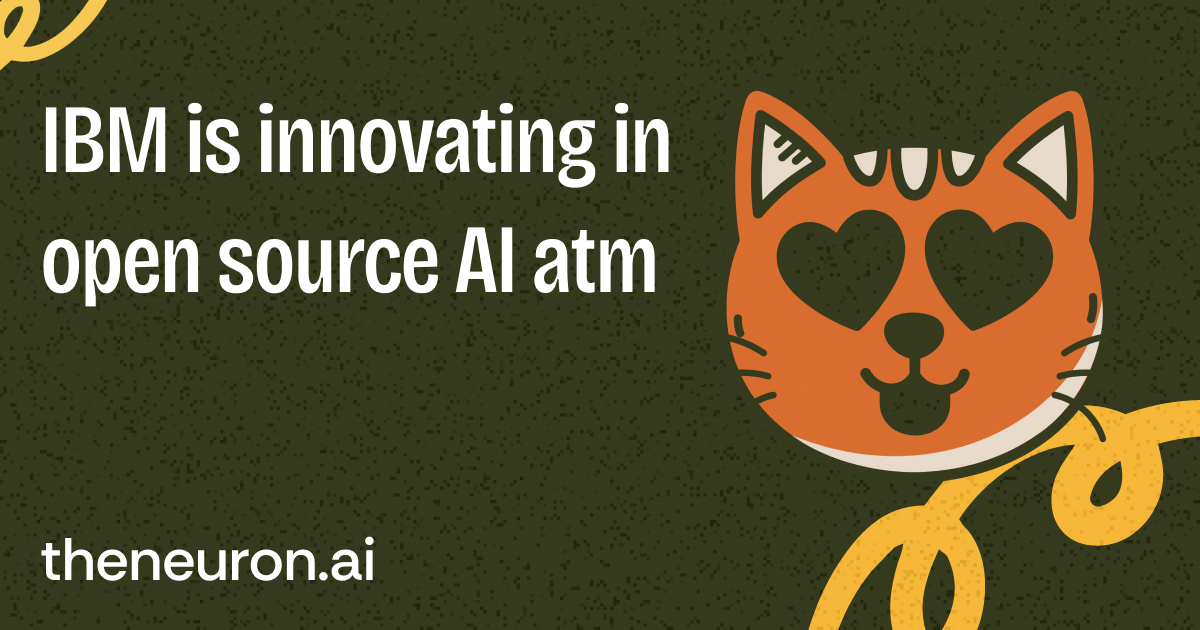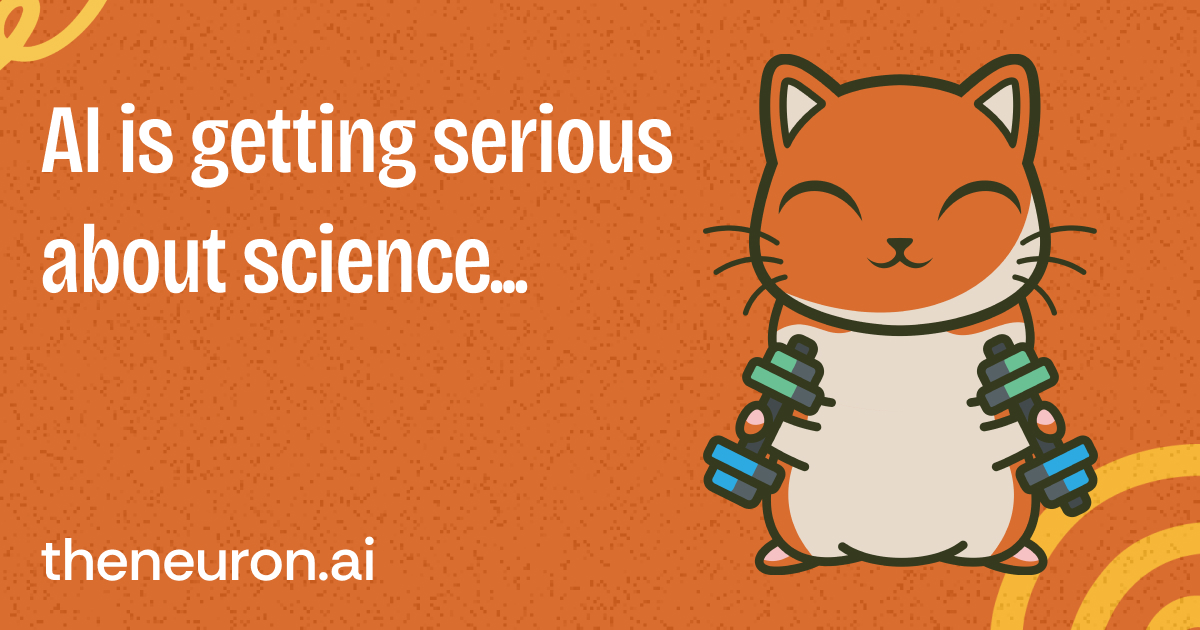Welcome, humans.
OpenAI is apparently going to test watermarks on its new image generator—for the free tier, anyway. This was just leaked on X along with a series of other minor updates.
This makes us wonder if Gemini ever fixed the fact that its own imgen can remove watermarks—because that would essentially negate the whole value of watermarks. Users could just generate in GPT, then edit in Gemini… easy solve.
In other news, it’s starting to look like the reason Meta released its new AI family, Llama 4, over the weekend is because these first few models might be a herd of duds.
Memes are already rolling in, rumors of resignations abound, and Artificial Analysis clocked the best of this pack (Maverick) as falling short, with DeepSeekv3.1 still #1:

But hey, #3 ain’t bad
Speaking of DeepSeek, it just released a new paper explaining a new reasoning method that we can pretty much bet will be used to power its upcoming R2 model…
Here’s what you need to know about AI today:
- We tested Gemini 2.5—and it’s really good.
- Meta announced it’ll unveil a reasoning model in a month.
- Judge rejected OpenAI's motion to dismiss NYT copyright lawsuit.
- Q1 2025 saw $113B in startup funding—with $59.6B for AI.

We finally dove into Gemini 2.5 Pro, and NGL, you really need to start using it.
We know, we know: we just told y’all last week not to sweat every new AI model that comes out (and just pick the best one for you). But after fully testing Gemini 2.5 ourselves, we gotta say—this one hits different.
It’s still free (for now) in AI Studio, and it packs some serious punch (anecdotally better than o1, and TBH, we agree).
We gotta give it to Google—they cooked with this one.
Here are three things you absolutely need to try:
- Use the “System Instructions.” This is crucial. Think of it like Custom / Project Instructions in ChatGPT or Claude. It lets you define the style, tone, or specific constraints you want Gemini to follow before you give it the main task. Super helpful for getting consistent outputs.

Here’s how we used it, including our Style Guide and writing style examples in the system instructions & our outline in the context window.
- Turn on “Grounding with Google Search.” This is HUGE. It lets Gemini fact-check itself using Google Search in real-time, pulling in fresh info so you don't have to constantly bounce out to verify details. You can get specific, too.

Try feeding it something like this for research:
Use Google Search to look up [topic one] and [topic two], searching Google News for the past week (today is April 7th, 2025). I need the latest facts, figures, expert quotes, and forecasts for each. Put findings in a bulleted list.
Gemini usually* cites its sources automatically, but not always. If not, just ask!
- Leverage that MASSIVE 1M Token Context Window. Seriously, 1M tokens is A LOT. We threw multiple multi-hundred-page reports and research papers at it, asking complex questions across long conversations, and forcing it to reference details from way back at the start... and it actually kept up! We were shook.
Fair warning though: With long context, you gotta be specific. Don't just say “summarize this”; tell it exactly what to focus on, and what kind of output you expect. Always remember to check its work—but when you guide it properly, it delivers.
A few other cool tricks:
- It handles complex instructions: Because it's a reasoning model, you can give it a multi-step sequence of tasks, and it generally follows along pretty well.
- Transcribe audio or images. Gemini 2.5 Pro is particularly savvy at extracting text from images (OCR) and transcribing audio files accurately (even though ones)—just upload them to AI Studio with the “+” button.
- Chat with Youtube videos. Hit the “+” and add a Youtube URL you want to chat with—but you can save tokens if you just upload the transcript instead.
- Watch it “think”: Gemini 2.5 Pro shows its work, breaking down how it interprets your prompt. This is gold for learning how to write better prompts— just copy its structured approach!
- In fact, sometimes, it even partially completes tasks within the thinking process—if you’re having it help you with an outline, read how it outlines in its thought process.
- This is also a good way to catch if Gemini is confused—example: sometimes it will “simulate” a Google search instead of actually using Google search. Watch out for this!

See how this is outlined? You can structure your prompt in a similar way—or, even better, ask Gemini to rewrite your prompts for you!
It’s also good at creative writing (example), coding (although a new coding specific model is on the way), and so much more.
What about cost? While the “preview” version in AI Studio is free (for now!), Google just rolled out paid API access. It’s priced similarly to Gemini 1.5 Pro and competitive to GPT-4o and Claude 3.7 Sonnet. Hat tip to Simon Willison for this breakdown.
Now, as a loss leader, the free access in AI Studio probably won't last forever. Google is already reportedly in talks to rent more NVIDIA chips from Coreweave—likely for training future models and running inference for models like this one at scale.
But for now, AI Studio is still the best place to kick the tires on Gemini 2.5 Pro without opening your wallet. Get in there and experiment while you can—you won’t regret it.

FROM OUR PARTNERS
🛠️ Simplifying RAG with Unstructured + AstraDB

Graph-based RAG methods promise greater precision but have been notoriously challenging to implement. Fortunately, recent advancements have greatly simplified these workflows! Graph RAG uses many of the same tools and techniques as traditional semantic similarity-based RAG, but also adds some important features.
Join Unstructured’s live session to learn how to:
- Use the Unstructured API to load data into Astra DB.
- Leverage the Custom Prompting Feature & OSS Graph Retriever library.
Register here to join live or to get the recording.

Prompt Tip of the Day
Here’s a prompt with writing tips to make your AI writing sound more human, built by someone building an SEO tool (take the prompt, ignore the tool promotion).
Also, the prompt suggests things to avoid—don’t frame it as “avoiding”, but frame it as “instead of X, do Y” with examples. It’ll perform better if you tell it WHAT to do, not what NOT to do.

Treats To Try.
- You can test both of Meta’s new Llama models, Scout and Maverick for free on OpenRouter.
- Adobe Premiere Pro and Davinci Resolve both added new AI features in their latest versions—Premiere now generates extra frames to extend clips and searches footage with AI, while DaVinci creates timelines from scripts and automatically switches camera angles based on speaker.
- Leonardo just released Motion 2.0 and Flux Elements—Motion 2.0 lets you generate videos from text prompts or images with smoother playback and higher frame rates, while Flux Elements allows you to train your own custom styles and apply your brand's unique look to image generations.
- Echo Memo is a chrome extension to bookmark posts across different social media platforms.
- Openspot helps you build a multimedia profile that showcases your personality and gets you more interviews than a standard resume.
- Openbnb finds hosts' direct booking websites while you browse Airbnb, helping you save up to 20% on fees.
- Experiments turns your personal challenges into trackable projects where you log progress like an experiment (this was made with Cursor, the AI coding tool).
See our top 51 AI Tools for Business here!

Around the Horn.

- Meta apparently plans to share news of a Llama 4 reasoning model “in the next month.”
- OpenAI lost its bid to dismiss The NYT's copyright lawsuit when Judge Stein ruled the company failed to prove the newspaper should have known about potential infringement before ChatGPT was released.
- Global startup funding hit $113B in Q1 of 2025, of which AI made up $59.6B, and of which $40B went to OpenAI’s mega-deal (meaning $19.6B went to other AI startups).
- Here are the top 10 AI papers from last week (according to the NLP Newsletter).
- Eli Lifland of the AI Futures project (who created the AI 2027 report) put out a response on X to the report’s top criticisms that’s worth a read.

FROM OUR PARTNERS
Google Cloud Next: Where AI Startups Go To Level Up

Check this out: Google Cloud Next's three-day startup event is specifically designed to help founders move beyond the “wouldn't it be cool if…” stage into building real AI businesses that scale.
What we love most? It's laser-focused on practical applications rather than theoretical possibilities. You'll walk away with actionable strategies rather than just inspiration.
Register today using the exclusive discount code 799STARTUP for just $799.**
**Space is limited, and this code is only valid through 11:59 PM PT on April 11, 2025, or until tickets are sold out.

Monday Meme


A Cat's Commentary.



.jpg)

.jpg)









